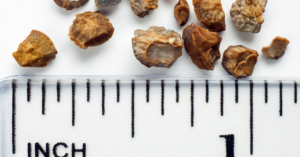Animal Breeds and Associated
Kidney & Bladder Stones and Crystals:

Different breeds develop different types of stones.
Basset Hounds: Cystine Crystals
Bichon Frises: Calcium Oxalate and Struvite crystals:
Bulldogs: Cystine and Urate Crystals
Calcium Oxalate: Miniature Schnauzer, Lhasa Apso, Yorkshire Terrier, Miniature Poodle, Shih Tzu, Bichon Fises, male dogs and cats
Calcium phosphate (also known as Hydroxyapatite) stones are formed in neutral to alkaline urine and are usually smooth and round. This is rarely a pure stone and is often found combined with calcium oxalate and struvite. Dogs predisposed to this type are Yorkshire Terriers, Miniature Schnauzers and Cocker Spaniels.
Cats mostly have Struvite (most common) or Calcium Oxalate crystals but urethral plugs are usually struvite in origin and mixed with cellular debris.
Chihuahuas: Cystine Crystals
Chinchillas: Kidney stones (uroliths) made of calcium oxalate can cause renal disease in chinchillas. The cause is presumed to be nutritional: moldy food, vitamin B6 deficiency, or a diet with too many plants high in oxalic acid (e.g., kale, mustard greens, and spinach).
Cocker Spaniel: Struvite crystals or Calcium Phosphate (Hydroxyapatite)
Cysteine Crystals form cystinuria is inherited and is a recessive trait in Newfoundlands. In other breeds it is sex linked and found primarily in male dogs. Dog breeds predisposed are Bulldogs, Dachshunds, Basset Hounds, Chihuahuas, Yorkshire Terriers, Irish Terriers and Newfoundlands (autosomal recessive genetic trait). Mostly in male dogs of these breeds.
Dachshunds: Cystine Crystals
Dalmatians: Urate Crystals
Ferrets: Pregnant ferrets are especially predisposed to urinary crystals
German Shepherd: Silicate stones
Golden Retriever: Silicate stones
Guinea Pigs: Calcium carbonate
Hamsters: Dissolving the stones is accompanied by appropriate antibiotic therapy. Dietary management to help dissolve the urinary stones and prevent their recurrence is not practical with hamsters.
Irish Terriers: Cystine Crystals
Labrador Retriever: Silicate stones
Lhasa Apsos: Calcium Oxalate
Llamas: Can get calcium and phosphorus crystals
Male dogs: Cystine Crystals
Miniature Poodle: Calcium Oxalate
Miniature Schnauzer: Calcium Oxalate, Calcium Phosphate (Hydroxyapatite), Struvite or Silicate stones
Newfoundlands: Cystine Crystals
Rabbits: Rabbits are prone to calcium oxalate crystals. Calcium in the urine is dependent on vitamin D absorption. When affected, the urine will appear thick and creamy or sandy. Prevention is through feeding more hay (less alfalfa and commercial pellets!) and by not using mineral supplements. Just use a plain salt block and not a mineral block. Rabbits also have an interesting thing they do with their feces. They eat their midnight poop! Guck.
Sheep and goats can both have bladder stones. Urinary calculi or “water belly” is a common metabolic disease of male sheep and goats. The disease occurs when calculi (stones), usually comprised of phosphate salts, lodge in the urinary tract and prevent urination. Normally, phosphorus is recycled through saliva and excreted via feces in ruminants. High grain, low roughage diets decrease the formation of saliva and therefore increase the amount of phosphorus excreted in the urine. The primary cause of urinary calculi is feeding concentrate diets which are excessive in phosphorus and magnesium and/or have an imbalance of calcium and phosphorus.
Lack of water and water sources that are high in minerals are also contributing factors. Like most disease conditions, it is better to prevent urinary calculi than to treat it. It can be prevented by feeding rations which contain a calcium-to-phosphorus ratio of at least 2:1. The ratio of Ca:P should never be allowed to go below 1:1. High calcium diets are effective at reducing the absorption of phosphorus from the gastrointestinal tract. Neither magnesium nor phosphorus should be added to concentrate diets.
Diets should also contain adequate amounts of vitamin A. Supplements should not be haphazardly added to otherwise balanced rations. Horse feed should not be fed to small ruminants because horse diets are not balanced for ruminants and can lead to stone formation
Shih Tzu: Calcium Oxalate
Silicate stones form in acid to neutral urine. They usually have a jackstone shape. Diets high in corn gluten or soybean hulls predispose the German Shepherd, Golden Retriever, Labrador Retriever and Miniature Schnauzer to this type of stone. Of course it this diet is not good for the skin either!
Yorkshire Terrier: Calcium Oxalate, Calcium Phosphate (Hydroxyapatite) or Cystine
Helpful Links and References for Stones in General and Stone Formation:
- Handbook of Small Animal Practice 2nd edition Edited by Rhea V. Morgan © 1992
- Some pics of the various stones: https://en.wikipedia.org/wiki/Bladder_stone_(animal)
- Stones, Drugs Causing Urinary Stones and Crystals: https://naturalhealthtechniques.com/drugs_causing_stones_crystals/
- Stones, Kidney, Bladder, Gall: https://naturalhealthtechniques.com/kidney-bladder-gallbladder-stones/
- Stones, Medical Treatments: https://naturalhealthtechniques.com/medical-treatments-for-stones/
- Stones, Natural Remedies: https://naturalhealthtechniques.com/natural-remedies-for-bladder-kidney-stones/